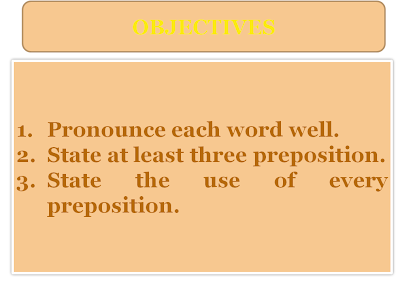Assalamualaikum... And A very good morning, everyone... the fifth lesson on this blog is....
PREPOSITIONS...... Hope all of U enjoy the lesson very well. :)
There are thousands and thousands of nouns verbs in English, but only about sixty prepositions.
Here are some of the most common.
Put in the correct preposition (choose in / on / at). If no preposition is need put in :
1) Lucy is arriving _____ February the 13th _____eight o'clock______the morning.
2) The weather is often terrible in London _____ January.
Put in the correct preposition:
1) He's swimming_______ the river.
2)Where's Julie? She's ______ school.
3) Stop worrying your ______ exam - everything will be fine.
4) I've waited _____ Judy for 30 minutes. I'm going home.







































